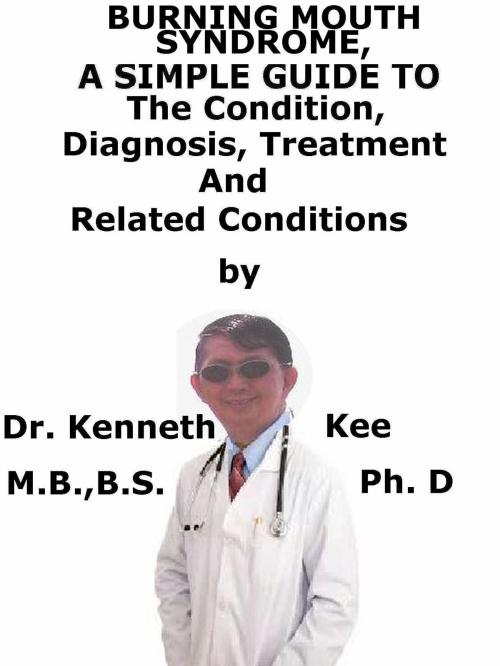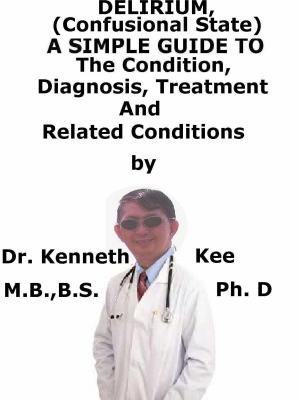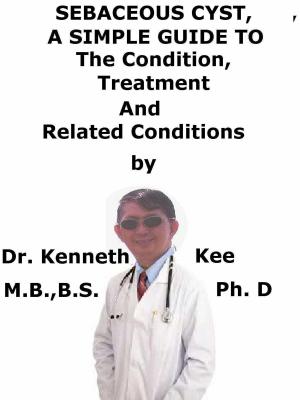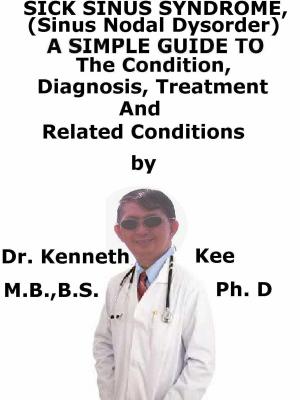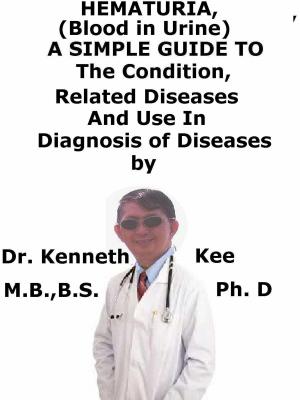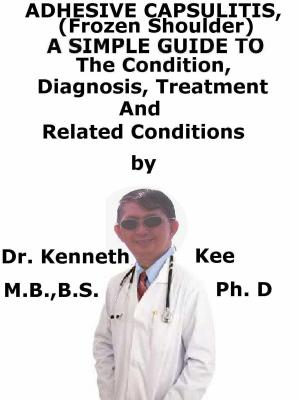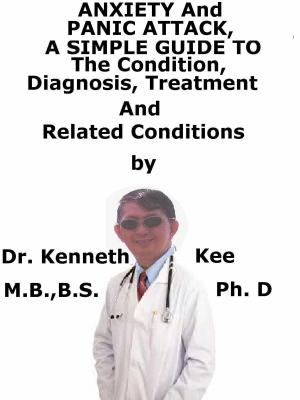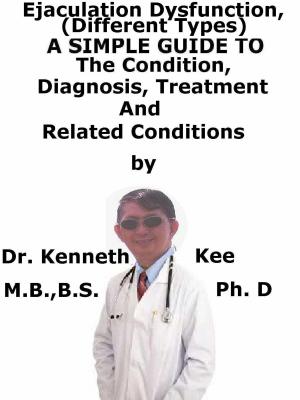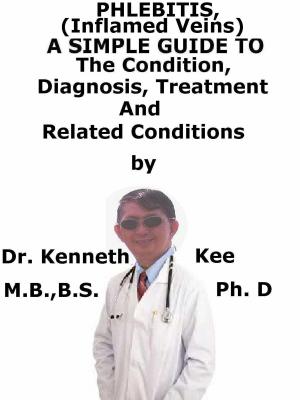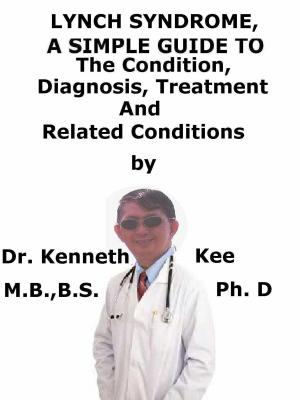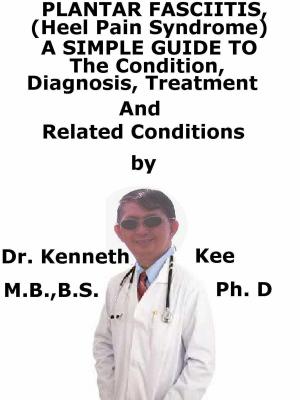Burning Mouth Syndrome, A Simple Guide To The Condition, Diagnosis, Treatment And Related Conditions
Nonfiction, Health & Well Being, Health, Ailments & Diseases, Oral Health, Nervous System & the Brain| Author: | Kenneth Kee | ISBN: | 9781370855476 |
| Publisher: | Kenneth Kee | Publication: | May 8, 2017 |
| Imprint: | Smashwords Edition | Language: | English |
| Author: | Kenneth Kee |
| ISBN: | 9781370855476 |
| Publisher: | Kenneth Kee |
| Publication: | May 8, 2017 |
| Imprint: | Smashwords Edition |
| Language: | English |
Burning mouth syndrome (BMS) is a non-inherited, non-infectious chronic medical disorder that is characterized by a burning intra-oral painful sensation.
The burning sensation can be serious, as though the patient has scalded the mouth.
Burning mouth syndrome can occur suddenly or develop slowly over time.
This burning sensation can involve the tongue, gums, lips and buccal mucosa either individually or collectively.
The tongue is the most often involved location.
BMS is also known as burning tongue syndrome, oral dysesthesia, glossodynia and glossopyrosis.
BMS is more frequent in women.
About one in three women have symptoms of BMS following the menopause.
Causes
Unfortunately, the cause often can not be found.
The cause of burning mouth syndrome can be categorized as either primary or secondary.
When no medical or laboratory abnormalities have been identified, the disorder is called primary or idiopathic burning mouth syndrome.
Primary burning mouth syndrome is believed to be linked to disorders with taste and sensory nerves of the peripheral or central nervous system.
Secondary burning mouth syndrome is produced by an underlying medical disorder.
Underlying disorders that may be linked to secondary burning mouth syndrome are:
1. Dry mouth (xerostomia)
2. Oral medical disorders, such as oral candida, oral lichen planus or geographic tongue
3. Nutritional deficiencies, such as inadequate iron, zinc, folate, thiamin, riboflavin,pyridoxine and cobalamin
4. Dentures, particularly if they do not fit well
5. Allergies to foods, food flavorings, other food additives, fragrances, dyes or dental-work substances
6. Reflux of stomach acid (GERD) entering the mouth from the stomach
7. Certain medicines, especially high blood pressure medicines
8. Oral habits, such as tongue thrusting, biting the tip of the tongue and teeth grinding
9. Endocrine disorders, such as diabetes or hypothyroidism
10. Excessive mouth irritation, resulting from over brushing the tongue
11. Psychological factors, such as anxiety, depression or stress
Diagnosis
There is no one test that can diagnose if the patient have burning mouth syndrome
Blood tests can check the full blood count, glucose level, thyroid and liver function, nutritional factors (, iron, folate, B12, zinc) and immune function, all of which may provide clues about the source of the mouth discomfort.
Oral cultures or biopsies
Allergy tests
Salivary measurements
Gastric reflux tests
The doctor may advise an MRI, CT scan or other imaging tests to check for other health disorders.
Temporarily stopping medicine to see if the discomfort goes away
Psychological questionnaires
Doctors believe that primary BMS is caused by damage to the nerves that control pain and taste
Treatment
Treatment may not be easy if there is no organic cause.
It is essential to treat any underlying disorders
Primary BMS treatment can be classified into lifestyle and drug treatments.
Patients with BMS normally benefit from reassurance and a combination of one or more of the treatments mentioned.
An essential part of BMS is to reassure the patient that they do not have cancer.
1. Cognitive behavioral therapy.
2. Benzydamine mouthwash.
3. Betnesol mouthwash
4. Antidepressants
5. Capsaicin
For secondary burning mouth syndrome, treatment is dependent on any underlying disorders that may be producing the mouth discomfort.
The replacement of poorly fitting dentures or taking supplements for a vitamin deficiency may alleviate the discomfort.
The doctor can prescribe medicine to help the patient treat mouth pain, dry mouth, or other symptoms.
TABLE OF CONTENT
Introduction
Chapter 1 Burning Mouth Syndrome
Chapter 2 Causes
Chapter 3 Symptoms
Chapter 4 Diagnosis
Chapter 5 Treatment
Chapter 6 Prognosis
Chapter 7 Dry Mouth
Chapter 8 Stomatitis
Epilogue
Burning mouth syndrome (BMS) is a non-inherited, non-infectious chronic medical disorder that is characterized by a burning intra-oral painful sensation.
The burning sensation can be serious, as though the patient has scalded the mouth.
Burning mouth syndrome can occur suddenly or develop slowly over time.
This burning sensation can involve the tongue, gums, lips and buccal mucosa either individually or collectively.
The tongue is the most often involved location.
BMS is also known as burning tongue syndrome, oral dysesthesia, glossodynia and glossopyrosis.
BMS is more frequent in women.
About one in three women have symptoms of BMS following the menopause.
Causes
Unfortunately, the cause often can not be found.
The cause of burning mouth syndrome can be categorized as either primary or secondary.
When no medical or laboratory abnormalities have been identified, the disorder is called primary or idiopathic burning mouth syndrome.
Primary burning mouth syndrome is believed to be linked to disorders with taste and sensory nerves of the peripheral or central nervous system.
Secondary burning mouth syndrome is produced by an underlying medical disorder.
Underlying disorders that may be linked to secondary burning mouth syndrome are:
1. Dry mouth (xerostomia)
2. Oral medical disorders, such as oral candida, oral lichen planus or geographic tongue
3. Nutritional deficiencies, such as inadequate iron, zinc, folate, thiamin, riboflavin,pyridoxine and cobalamin
4. Dentures, particularly if they do not fit well
5. Allergies to foods, food flavorings, other food additives, fragrances, dyes or dental-work substances
6. Reflux of stomach acid (GERD) entering the mouth from the stomach
7. Certain medicines, especially high blood pressure medicines
8. Oral habits, such as tongue thrusting, biting the tip of the tongue and teeth grinding
9. Endocrine disorders, such as diabetes or hypothyroidism
10. Excessive mouth irritation, resulting from over brushing the tongue
11. Psychological factors, such as anxiety, depression or stress
Diagnosis
There is no one test that can diagnose if the patient have burning mouth syndrome
Blood tests can check the full blood count, glucose level, thyroid and liver function, nutritional factors (, iron, folate, B12, zinc) and immune function, all of which may provide clues about the source of the mouth discomfort.
Oral cultures or biopsies
Allergy tests
Salivary measurements
Gastric reflux tests
The doctor may advise an MRI, CT scan or other imaging tests to check for other health disorders.
Temporarily stopping medicine to see if the discomfort goes away
Psychological questionnaires
Doctors believe that primary BMS is caused by damage to the nerves that control pain and taste
Treatment
Treatment may not be easy if there is no organic cause.
It is essential to treat any underlying disorders
Primary BMS treatment can be classified into lifestyle and drug treatments.
Patients with BMS normally benefit from reassurance and a combination of one or more of the treatments mentioned.
An essential part of BMS is to reassure the patient that they do not have cancer.
1. Cognitive behavioral therapy.
2. Benzydamine mouthwash.
3. Betnesol mouthwash
4. Antidepressants
5. Capsaicin
For secondary burning mouth syndrome, treatment is dependent on any underlying disorders that may be producing the mouth discomfort.
The replacement of poorly fitting dentures or taking supplements for a vitamin deficiency may alleviate the discomfort.
The doctor can prescribe medicine to help the patient treat mouth pain, dry mouth, or other symptoms.
TABLE OF CONTENT
Introduction
Chapter 1 Burning Mouth Syndrome
Chapter 2 Causes
Chapter 3 Symptoms
Chapter 4 Diagnosis
Chapter 5 Treatment
Chapter 6 Prognosis
Chapter 7 Dry Mouth
Chapter 8 Stomatitis
Epilogue
